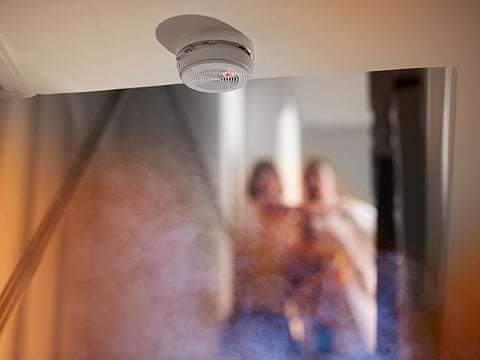Make sure your home is safe at all times in the UAE
How safe is your home? Fire risk, bad air quality, dangerous balconies and more dangers lurk indoors

Child-proofing a home and keeping the indoors safe is a big responsibility and parents need to be keenly aware of its various dimensions and solutions.
In 2016, Dubai Municipality’s Public Health and Safety Department recorded 24 domestic accidents in the emirate which included falls from a height, drowning in swimming pools, burns, and injuries from falling objects and gardening machinery. Burns, poisoning, suffocation and choking, and strangulation with various objects including blind cords, are deemed common domestic accidents.
How to fire-proof your house
1. Make sure that your fire extinguishers are well within reach and educate your older kids on how and when to use them.
2. Ensure all flammable substances including perfumes, deodorants, lighters, oils, and more are kept at high places and away from children’s reach.
3. Ensure that smoke alarms are installed, and most importantly, working without fault at all times.
4. Love carpeting? Use fire-resistant carpets and/or rugs all across the house.
5. Never overload power sockets and if wires are frayed or damaged, practice safe practices while connecting appliances.
6. Switch off all your power appliances from the socket; better yet unplug cables and extension cables every night before sleeping
7. Using scented candles should be done very carefully and away from curtains, carpets, any flammable materials. Avoid using them if you can, go for electric diffusers instead for a nice scent throughout the house.
8. Did you know you could fireproof your furniture with sprays? If buying your own furniture, try and get a fireproof spray that you can apply yourself, especially for bedrooms and nurseries.
How to keep your kitchen safe
1. Keep kitchen equipment and tools well-organised
2. Keep small children out of the kitchen while cooking; never leave children in the kitchen when you step out, even for a minute
3. Avoid wearing inappropriate clothing such as long sleeves or flammable materials in the kitchen
4. Put a childproof lock on your oven to prevent danger
5. When not in use, unplug your microwave, blender, juicers etc.
6. Keep matches and lighters out of reach of children
7. Place gas cylinders in a well-ventilated location (using gas cylinders is extremely dangerous and even illegal in Dubai – ask your building owner/developers to install centralised gas)
8. Do not expose the cylinder (if used) directly to sun or other heat sources
9. Keep a fire extinguisher in or near the kitchen
10. Ensure gas valve/regulator is closed before leaving the kitchen even if you are in the house and not cooking
How to ensure good air quality in your home
Pollutants inside your home, school or office such as carbon dioxide (CO2), carbon monoxide (CO), formaldehyde, volatile organic compounds (VOC), dust, moulds, viruses, and bacteria may be present in high levels and are not being flushed out if your indoor air is poorly circulated.
It is estimated that people spend 21 hours — 90 per cent of their time — indoors daily. This is especially true in the UAE as summer months push the mercury up from 40 degrees Celsius to almost 50C.
A municipal order in Dubai requires public buildings such as government offices, hotels, malls, and airports to have their indoor air quality tested every three years or if any changes in the design or activity in the building is made.
1. To make sure fresh air is circulating in your house, set your AC’s air circulation setting to 50 per cent. This way it will take at least 50 per cent of air from outside to flush the room inside.
2. A very easy way to get good indoor air quality is to open your window half an hour in the morning and half an hour in the evening when the weather permits. This will automatically flush the pollutants and bring fresh air inside. It will dilute the concentration of pollutants inside the house.
3. Conduct regular maintenance for your AC. Cleaning the AC ducts will help you breathe in clean air.
4. Put plants inside the house. Plants emit oxygen.
5. Avoid using humidifiers and atomisers. Avoid drying clothes inside the house, especially during winter. Doing so will keep moisture content inside the house high and support mould growth.
6. Make sure your cleaning agents and detergent pods are tightly closed and stored in a room that has proper ventilation.
7. Choose furniture that does not emit formaldehyde or VOCs
Balcony and staircase safety
1. Install safety gates for staircases to avoid your child from falling
2. Install child locks at adult height on balconies, main doors and any other gates
3. Gap between the stair balusters should not exceed four inches
4. Do not keep furniture, tables, or chairs near windows or balconies
5. Install safety barriers on high places like windows or balconies to prevent children from falling
6. Put safety guard pieces to protect sharp corners at home
7. Store sharp tools and equipment in enclosed areas
8. Secure all equipment, wires or materials laid on the floor to ensure safety



